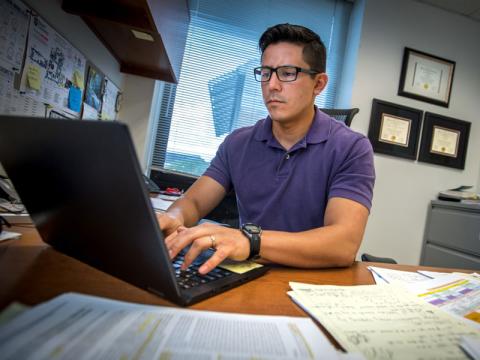Nicholas R. Sandoval, Ph.D.
Associate Professor

Office
326 Lindy Boggs Building
Department of Chemical and Biomolecular Engineering
Tulane University
New Orleans, LA 70118-5674
Courses Taught
Transport Phenomena II (CENG 3330)
Biomolecular and Cellular Engineering (CENG 6870)
Education & Affiliations
Biography
Nicholas R. Sandoval joined the Tulane University faculty in the Department of Chemical and Biomolecular Engineering in 2016. He graduated summa cum laude with a B.S. in Chemical Engineering in 2006 from the University of Colorado Boulder. He earned his Ph.D. in 2011 at the University of Colorado Boulder in Ryan Gill’s research group with support from an NSF Graduate Research Fellowship. There he investigated mechanisms of lignocellulosic hydrolysate tolerance in E. coli using genome engineering methods. Dr. Sandoval then lectured the following academic year in the Colorado Mesa University/University of Colorado Mechanical Engineering Partnership Program in Grand Junction, Colorado. Under an NIH funded National Research Service Award, he worked as a postdoctoral fellow in the Department of Chemical and Biomolecular Engineering at the University of Delaware in the Papoutsakis research group where his work focused on genome engineering anaerobic solventogenic bacteria among other projects.
Research Interests
Genome Engineering, Metabolic Engineering, Biofuels, biosensors, sequence-function elucidation
The Sandoval Lab works on the development and application of advanced synthetic biology tools for model and non-model microbes for the purpose of sustainable fuel and chemical production. This includes the efficient use of directed evolution to engineer such microbes from the gene to genome level as well as high throughput tools for analysis and engineering such as DNA synthesis, next generation sequencing, and cell sorting.
Sequencing and synthesis of DNA are increasingly affordable, making genome engineering and analysis quicker and cheaper than ever before. The broad potential of directed evolution in light of these advances is enormous. A powerful strategy is to generate an initial genetic diversity (from the gene to genome level) and then select or screen for the desired trait. Without high-throughput sequencing, the selection mechanism and population dynamics are a black box, but next-generation sequencing makes examining whole genomes and transcriptomes for individuals as well as populations not only possible, but relatively simple and inexpensive, thus enabling a greater biological understanding.
The question now turns to what/why/how genetic constructs need to be made and explored for a biotechnologically relevant outcome. The aims of the Sandoval Lab’s efforts are to expand the search space (non-model organisms and the metagenome) to explore as many functional variations as possible, that is, to rethink what the search space comprises and how it is searched.
Publications
Joseph RC, Kim NK, Sandoval NR: Recent developments in the synthetic biology tool kit in Clostridium. Frontiers in Microbiology 2018; 9, 154. doi: 10.3389/fmicb.2018.00154
Rohlhill J, Sandoval NR, Papoutsakis ET. Sort-Seq Approach to Engineering a Formaldehyde-Inducible Promoter for Dynamically Regulated Escherichia coli Growth on Methanol. ACS Synth Biol. 2017. doi: 10.1021/ascsynbio.7b00114.
Long CP, Au J, Sandoval NR, Gebreselassie NA, Antoniewicz MR. Enzyme I facilitates reverse flux from pyrubate to phosphoenolpyruvate in Escherichia coli. Nat Commun. 2017;8:14316
Sandoval NR, Papoutsakis ET: Engineering membrane and cell-wall programs for tolerance to toxic chemicals: Beyond solo genes. Curr Opin Microbiol 2016, 33:56-66.
CP Long, JE Gonzalez, NR Sandoval, MR Antoniewicz: Characterization of physiological responses to 22 gene knockouts in Escherichia coli central carbon metabolism, Metab eng, 37 (2016).
Cordova LT, Lu J, Cipolla RM, Sandoval NR, and Antoniewicz MR: Simultaneous utilization of glucose and xylose by an evolved Thermus thermophilus strain elucidated by 13C metabolic flux analysis and genome sequencing. Metab eng, 37 (2016) 63-71.
Sandoval NR, Venkataramanan KP, Groth TS, Papoutsakis ET: Genome sequencing identifies Spo0A inactivation in Clostridium pasteurianum as imparting enhanced tolerance to crude glycerol and increased growth-associated butanol production. Biotechnology for biofuels, 8 (2015) 227.
Gaida SM*, Sandoval NR*, Nicolaou SA, Chen Y, and Papoutsakis ET: Expression of heterologous sigma factors enables functional screening of metagenomic and heterologous genomic libraries Nat Comm 2015, 6:7045.
Whitaker WB, Sandoval NR, Bennett RK, and Papoutsakis ET: Synthetic methylotrophy: engineering the production of biofuels and chemicals based on the biology of aerobic methanol utilization. Curr Opin Biotechnol. (2015) 33:165–175.
Glebes TY, Sandoval NR, Gillis JH and Gill RT: Comparison of genome-wide selection strategies to identify furfural tolerance genes in Escherichia coli. Biotechnol Bioeng. (2015) 112:129-140.
Glebes TY, Sandoval NR, Reeder PJ, Schilling KD, Zhang M, Gill RT: Genome-wide mapping of furfural tolerance genes in Escherichia coli. PLoS One 9(1): e87540.
Sandoval NR, Kim JYH, Reeder P, Glebes TY, Aucoin HR, Warner JR, and Gill RT: A Strategy for Directing Combinatorial Genome Engineering in E. coli. PNAS 26 (2012) 10540-10545.
Sandoval NR, Mills TY, Zhang M, and Gill RT: Elucidating acetate tolerance in E. coli using a genome-wide approach. Metab Eng. 13 (2010) 214-224.
Mills TY*, Sandoval NR*, and Gill RT: Cellulosic hydrolysate toxicity and tolerance mechanisms in Escherichia coli. Biotechnol Biofuels (2009) 2:26.
